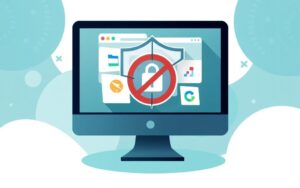Table of Contents
Many people struggle to visit certain websites today. This is because of rules set by schools, work, countries, or governments. They block access to these sites. But, there are ways to bypass restrictions and see blocked sites again. This article will show you how to unblock websites on your computer. You’ll be able to get to the online content you need, no matter the obstacles.
We will look into various methods to access these sites on your PC. This includes using VPNs, proxy servers, and changing browser settings. These tools focus on keeping your privacy safe and making things work smoothly. By learning about these options, you’ll know how to freely surf the internet. You’ll get back to the important information you’re missing out on.
To really understand how to use these methods, check out this resource. It offers great advice on unblocking websites safely and effectively.
Introduction to Bypassing Website Restrictions
Website restrictions come from many places, like governments, companies, or schools. They might block harmful or illegal sites, keep browsing work-related, or follow laws. Knowing about website restrictions is key for free digital navigation.
There are many ways to get around these limits. VPNs create a secure link to help users avoid filters. Proxy servers act as a middleman for internet access, allowing entry to blocked sites. The Tor network also offers anonymous web browsing, using a network of servers for bypassing website restrictions.
Web filters use URL, content, and keyword filtering to apply restrictions. This can slow down internet speeds when trying to use some services. To handle these issues, finding the right tools and methods to bypass restrictions is useful. Check out this guide on website blocking methods for more info.
Common Reasons Websites Are Restricted
There are several reasons why websites get blocked. Geo-blocking is one way, especially noticeable with sites like Netflix. Your location decides if you can watch certain shows or not. This is because of agreements about who can show what and where.
Government rules also play a big part in blocking sites. In places like China, a system known as the Great Firewall restricts many foreign sites. This is to control what people see and to keep certain ideas out.
In schools and offices, some websites are off-limits to boost focus and keep the web safe. Pages that might distract, like social media or gambling sites, are often blocked. Tools like Work Examiner help by watching what sites people visit and blocking the not-so-good ones.
This blocking makes it hard for people to see what they want online. It leads to them trying to find ways around these bans. It’s a constant battle between wanting free access and facing restrictions.
| Reason | Description |
|---|---|
| Geo-blocking | Access limitations based on user location, common in streaming services. |
| Governmental Censorship | Strict controls on content access, as seen in regimes like China’s Great Firewall. |
| Institutional Policies | Restrictions aimed at improving productivity in workplaces and educational settings. |
| Content Filtering | Prevention of access to inappropriate or distracting websites within controlled environments. |
Using a VPN to Bypass Restrictions
A VPN, or virtual private network, is key for avoiding online restrictions. Services like Netflix use geo-blocking to control what you can watch. They restrict shows based on where you are. In some countries, governments block access to sites like Twitter and Instagram. Schools and workplaces might also block sites to keep people focused.
Advantages of Using a VPN
By using a VPN, you get around these blocks with more security and privacy. Here’s how it helps:
- IP Address Masking: It gives you an IP address from a different country, letting you access blocked sites.
- Improved Security: VPNs protect your data from hackers by encrypting it.
- Bypass Restrictions: You can get past blocks set by governments or workplaces.
- Wide Range of Options: There are many VPNs to choose from, like ExpressVPN or CyberGhost.
Choosing the Right VPN Service
Finding the best VPN service means considering several factors:
| Feature | Importance |
|---|---|
| Privacy Policies | Choosing a VPN that doesn’t keep logs is vital for your privacy. |
| Server Locations | Having more servers means you can more easily avoid restrictions. |
| Reliability and Speed | A reliable and fast VPN is crucial for watching HD content smoothly. |
| Obfuscation Features | This feature helps hide that you’re using a VPN, making it harder to detect. |
| Customer Support | Good support helps with any setup or problems. |
Premium VPNs like ExpressVPN are top picks because of their strong features. They offer automatic obfuscation and respect privacy rules. Remember to use a VPN within the law and enjoy safer internet access.
How to Open Block Site in PC Using Tor
Using Tor lets you bypass blocks and surf the web anonymously. It encrypts your web traffic, making it hard for sites to track or block you. Knowing how to set up Tor is key for those wanting privacy online and to get around restrictions.
Understanding the Tor Network and Its Benefits
Tor has over 7,000 nodes that help keep your data safe as it travels. Unlike VPNs, Tor is run by volunteers and doesn’t rely on a central provider. Your data is encrypted from start to finish, boosting privacy. While Tor supports anonymous browsing and access to “.onion” sites, be prepared for slower speeds and some website issues.
Do not add extra browser plugins as they could risk your anonymity. Even though Tor is great for privacy, it might not work with every site.
Setting Up Tor on Your PC
First, download the Tor Browser only from the official Tor Project website. The setup takes 15 to 30 minutes and is fairly straightforward. It’s vital to be sure you’re using the genuine software, especially for users with Windows 10 or newer operating systems.
Remember, only activities within the Tor Browser are hidden. For maximum privacy, use the “Safest” browser settings. This may restrict some site features. Tor doesn’t keep cookies, which means your history and cached data are wiped when you close the browser.
If you’re facing blocks, try choosing a “bridge” in your region. It’s useful to know how Tor works for private browsing. Adding a VPN with Tor can help protect against tracking, offering even stronger security and privacy.

Accessing Blocked Websites with a Proxy Server
A proxy server is like a middleman between you and the internet. It helps users access websites that might be blocked due to location or network rules. By hiding your IP address with a reliable proxy, you can explore content that’s usually out of reach.
It’s key to know the good and bad points of proxy servers. These servers are great for getting past blocks, especially at schools or work. There, internet access might be limited by those in charge.
However, proxies come with security concerns. They often don’t protect your data as VPNs do. So, picking a trustworthy proxy service is crucial to stay safe online while visiting blocked sites.
If you’re looking for ways to bypass internet restrictions, there are several options:
- Free web proxies you can find online
- Paid proxy services that ask for a monthly fee
- Creating your own proxy server for more control over your internet
But remember, proxies have their limitations. Some websites might still catch and block proxy users. So, it’s important to keep updating your proxy choice to keep accessing the content you want.
| Proxy Type | Pros | Cons |
|---|---|---|
| Free Web Proxies | No cost; easy to use | Limited speed and security; may log user data |
| Paid Proxy Services | Better performance; focuses on privacy | Requires a subscription; quality varies |
| Local Proxy Server | Customisable; great for local networks | Needs technical skills; regular upkeep required |
Utilising Browser Extensions for Website Unblocking
Browser extensions are now strong tools for getting past website blocks. They make it easy to reach blocked content right from the browser. Providing a range of functions, they improve browsing for users.
Popular Browser Extensions to Consider
One top Chrome extension is BlockSite, downloaded over three million times. It lets users easily block websites. With the free version, you can manage up to three blocked sites. For even more features like unlimited blocks and password protection, the premium option is available at $3.99 a month.
Limitations of Browser Extensions
Browser extensions offer ease but have downsides to think about. Security is a big worry. There’s a risk of downloading harmful extensions. Also, these browser extensions must be installed on each device used, making it hard to use across many. Editing the host’s file on Windows or macOS might be better for total website blocking on all browsers and apps. Knowing these points helps make better choices in using website unblockers.
Alternative Methods to Bypass Website Restrictions
Looking for ways to see blocked content calls for thinking outside the box. Trying URL shorteners or using web archives can help. Each method has its pros and cons.
Using URL Shorteners for Quick Access
Shortening services like Bitly can help get around blocks. They turn long links into short ones. This can sometimes trick simple blocks. Although not foolproof, they’re handy for bypassing some restrictions.
Exploring Reliable Web Archives
The Wayback Machine lets you see older versions of websites. It keeps snapshots of web pages through time. This means you can access info that’s not on the live site anymore. But, it might not have the newest data.
| Method | Advantages | Disadvantages |
|---|---|---|
| URL Shorteners | – Quick access to blocked content – Simple to use |
– May not work against advanced filters – Limited security |
| Wayback Machine | – Access to archived web pages – Non-intrusive method |
– Doesn’t provide current content – Limited by archiving frequency |
Conclusion
Being able to get past restrictions is key for people wanting full internet access. We’ve looked at various methods, like VPNs, Tor, proxy servers, and browser plugins. Each method lets users deal with web filters and supports internet freedom.
It’s important, though, to follow local laws when using these tools. Making decisions ethically matters because ignoring internet blocks can lead to problems. Knowing the risks, including threats to online safety and breaking rules, is crucial.
In the end, seeking internet freedom is good but must be done with care. The strategies we’ve talked about help avoid restrictions responsibly. This way, users stay safe and respectful to rules during their online adventures.
FAQ
What are the main reasons websites are restricted?
Websites might be restricted due to geo-blocking by platforms like Netflix. They could also be limited by governmental censorship. Schools and workplaces might block them to increase productivity.
How can a VPN help in bypassing restrictions?
A VPN encrypts your internet connection. This lets you change your virtual location. It makes accessing geo-blocked content secure and easy.
What is the Tor network, and how does it work?
The Tor network helps anonymise your internet use. It uses multi-layer encryption to protect your identity. This assists users in effectively bypassing content restrictions.
Are there any risks associated with using proxy servers?
Proxy servers unblock websites but don’t encrypt your data. This makes your information open to being intercepted. They are less secure compared to VPNs.
What popular browser extensions can I use to unblock websites?
Popular extensions include Hola, Browsec, and ZenMate. They let you access blocked sites through your browser. Still, beware of possible security risks and compatibility issues.
Can URL shorteners really help bypass restrictions?
Yes, URL shorteners like Bitly might trick simple content filters. They provide easier access to blocked sites. Their success varies with the restrictions’ complexity.
How do I choose the right VPN service?
Choosing a VPN service? Look at factors like privacy policies and server locations. Consider connection speed and user reviews. Choose a reliable provider to bypass restrictions.
What are the consequences of bypassing internet restrictions?
Bypassing internet restrictions might lead to legal issues. These depend on local laws and regulations. It’s important to understand these laws to avoid getting into trouble.









